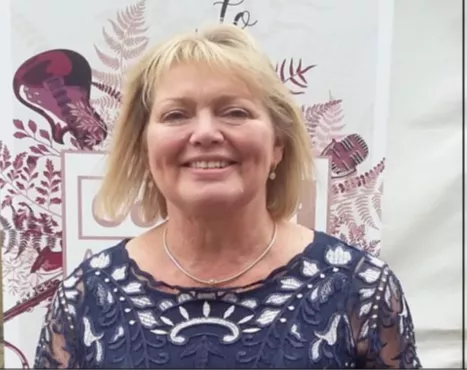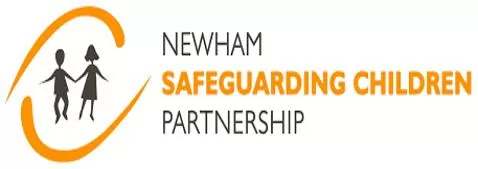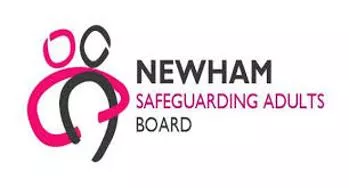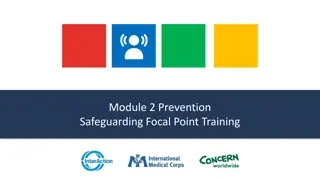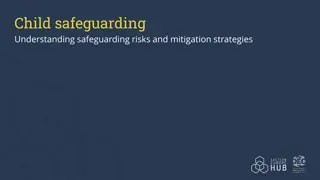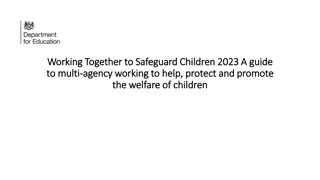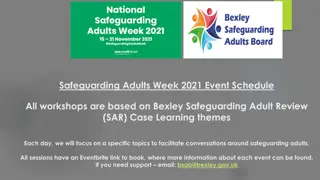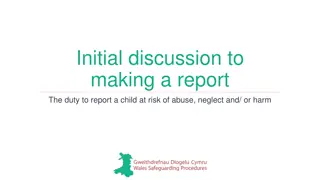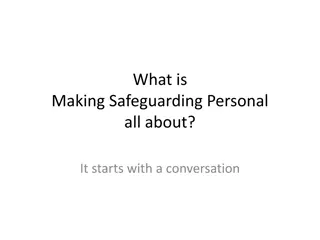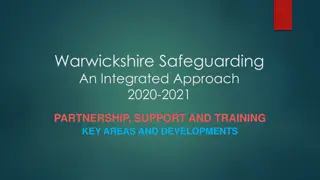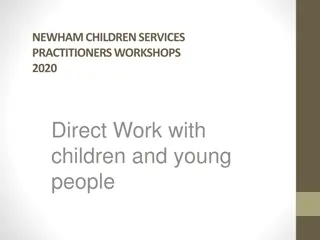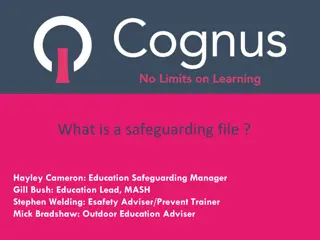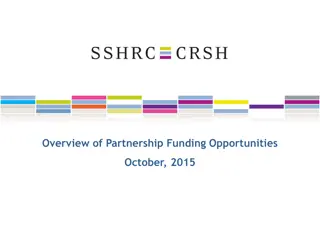Newham Safeguarding Partnership Review Event Highlights
Explore the recent joint priority review event hosted by NSCB & NSAB in Newham. Gain insights into the aims, objectives, purpose, and core duties of the Newham Safeguarding Adults Board. Learn about their role in improving local safeguarding arrangements and ensuring the well-being of adults at risk. Discover how Newham is fostering a safe and inclusive environment for children and young people to thrive.
Download Presentation

Please find below an Image/Link to download the presentation.
The content on the website is provided AS IS for your information and personal use only. It may not be sold, licensed, or shared on other websites without obtaining consent from the author. Download presentation by click this link. If you encounter any issues during the download, it is possible that the publisher has removed the file from their server.
E N D
Presentation Transcript
NSCB & NSAB NSCB & NSAB JOINT Priority review event JOINT Priority review event 23RDAPRIL 2021
Introduction and welcome from NSCP Chair Newham Safeguarding Children Partnership Chair: Julia Stephens Row
Aims and objectives for todays event Aims and objectives for todays event To receive an update on progress regarding two of the priorities for the safeguarding partnerships. To receive an update on the current context in which this work is taking place. To hear the voice of service users and engagement mechanisms.
Purpose of Newham SAB The Board s primary purpose is to improve local safeguarding arrangements and ensure partnerships act to help and protect adults at risk or experiencing neglect and/or abuse.
SABs Role Assurance that local safeguarding arrangements are in place as defined by the Care Act 2014 and statutory guidance Assurance that safeguarding practice is person-centred and outcome-focused Working collaboratively to prevent abuse and neglect where possible Ensuring partner agencies and individuals give timely and proportionate responses when abuse or neglect have occurred assuring itself that safeguarding practice is continuously improving and enhancing the quality of life of adults in its area.
Core duties of Newham SAB Safeguarding Adults Boards have three core duties. To: Develop and publish a strategic plan setting out how they will meet their objectives and how their member and partner agencies will contribute Publish an annual report detailing how effective their work has been Commission safeguarding adults reviews (SARs) for any cases which meet the criteria for these.
Newham Together Making the best place for children and young people All young people in Newham will; oGrow up healthy, happy and safe oFlourish in our schools oBenefit from training skills and employment opportunities oPlay an active role in the community
Core Objectives for NSCP To co-ordinate what is done by each agency to safeguard and promote the welfare of children And To ensure the effectiveness of what is done by each agency and by agencies working together The Newham Safeguarding Children's Partnership aims to be a mature, high trust partnership in which conflicts are resolved through conversation Presented by
The Joint Priorities for 2020/22 All age exploitation - To coordinate and drive forward multi-agency programs and interventions in Newham which combat exploitation in all its forms e.g financial abuse, modern slavery, sexual exploitation, criminal exploitation and radicalisation Transitions - Moving from child to adulthood in a safe and positive way Focusing on care leavers; children with learning disabilities and special educational needs; those experiencing difficulties with mental health; young parents.
Hearing the voice of Newham children, young people & adults
Engaging with Newhams communities
What principles are we working? On-going community engagement about the work of the Safeguarding Adults Board Ensure that the voice of the service user informs everything we do Improve the quality of engagement with all partners and sections of the community to strengthen adult safeguarding in Newham Respond effectively to safeguarding concerns Demonstrate how the NSAB is making a difference
So what are we going to do? Establish a Task Group to oversee this piece of work Invite residents interested/knowledgeable about safeguarding to join the Task Group Deliver an engagement programme between April October 2021 Publish our findings at a series of community safeguarding events in National Safeguarding Week
What do we want to find out? What are the key issues for vulnerable adults in keeping safe in Newham What can vulnerable people do to keep safe at home and in the community? What are the main things the public need to know about safeguarding vulnerable adults? What should Newham Safeguarding Adults Board tell people about how to best protect themselves? What do you think the priorities should be for Newham Safeguarding Adults Board s and why? What do you think about the NSAB newsletter?
What would this include? Presence in the local community pop up stalls Focus groups with different communities Poster/information distribution Community mapping Online Survey
CCG Safeguarding voice of the Child April 2021
Safeguarding Voice of the Child - surveys During Nov-Dec 2020 the CCG carried out surveys in relation to Covid and how this has been affecting them. Key findings included: 157 LAC children living in Newham, mostly girls responded. The majority felt well/good. With 17.5% said they were not feeling great and 6.5% saying they felt really bad. Main concerns (which reflected national findings) identified across all 157 children were: Education worries Staying safe from Covid virus Mental health Friendships and family Emotional / mental health support Of those who said they were supported with their mental health they reported this came from, family and friends, school counselling and the GP. When asked if they knew where to get help 80% said they did.
Safeguarding Voice of the Child - surveys Survey of how young people are feeling in North East London CCG s Summary report. January 2021 Responders: 1,113 living in NEL. Age range 11 16 years. Survey responders reflected NEL diversity. Findings included- emotional health highlighted by nearly a third of young people, key findings as in the previous slide and additions: Alluding to education and exam stress Almost 1.4 saying they felt stressed 1 in 4 young people are worried about money in the future.
Examples of voice of the child East London Foundation Trust provider: Have commenced (2021) a programme of communication with children and young people to inform safeguarding services: The first session found that: Children aware of safeguarding They wanted to know when confidentiality was going to be broken it is their story. Barriers to disclosing safeguarding issues: Risk to safety for themselves, family and friends Cultural family views Making things worse The Health team for Children Looked After have a long history if including the voice of the child in their health assessments.
Barts (Newham University Hospital) have carried out several pieces of work that has influenced change such as the Youth Empowerment forum have completed short videos available for training across the trust on the intranet communicating with young people in an age-appropriate language . St Giles (St.G) and Newham University Hospital Case Study 1 Emergency Department Team (ED) recognised that Child A was potentially involved with violence and introduced the St Giles workers. This enabled disclosure that Child A was a victim of violence and feared for his safety. Work subsequently took place and child A now feels safe.
Case Study 2 This child was identified by the ED team and linked Child B with the St.G. Child B felt let down by all professionals and disengaged. This is being fed back to CAMHS (one of the professional groups named by child B) for learning. These two case studies highlighted conditions that are needed to identify children such as: - The Consultant in Emergency Medicine and Paediatric Emergency Medicine is the St.G champion at Newham ED and has really been proactive and supported the St.G team being embedded into the ED Department. - St Giles team provide on site training for ED staff on identification, trauma informed work - Working closely with the ED staff, attending meetings and building relationship
The CCG As part of a seven case health review of children in the care system who are placed out of borough, one child specifically wanted to contribute, which has been included and will form part of the outcome. (This work is currently taking place) 2021- 22 the CCG to forward plan voice of the child safeguarding programme.
Newham Young People Video https://youtu.be/GJNbYlFh6oM
PARIS aged 16 People involved in her life: Police Safer London Children Social Care Youth Empowerment Virtual School Health Advisor and CAMHS Paris came into care because she was being exploited in a number of ways at home she was neglected and her mental wellbeing was impacted negatively in a very big way at the time she was unaware of what was really going on and why she was being treated in this way but emotionally she could not handle the trauma and was self-harming and having major suicidal thoughts
At times I have felt like Ive not been heard by professionals and when I do open up I feel like I get punished when all I want is support and comfort. Instead I keep being moved and my freedom taken away as well as my belongings. At times I know im acting out of order but I think its because I don t think anyone realises that I need help, no one actually knows me well enough to know Im asking for help. Voice of the young person Paris shared that she has always been concerned about the amount of people that are in and out of her life An inability to establish long lasting relationships with professionals because of it Feeling like she has to share all her life with the world and having no privacy the lack of consistency with regard the support she receives. Paris shared that not having a stable home due to being moved so much up and down the country, made her lose enthusiasm to actually want to help herself in education and securing her future
Barriers/Gaps: Paris shared that. Barriers/Gaps: Paris shared that . Too many different social workers in her life make her feel that she never moves forward because the moment something is actually being done the social worker is gone and then everything starts afresh again, this disheartens Paris and then she dis engages. Being moved to multiple placements makes her feel there is no point of building up something for herself because she is only going to move again Not making a proper bond with her keyworker in any home Not being able to have a 1-1 regularly that will support her and encourage her to keep up her progress No activities or structure put in place at home so just falls through the gap and finds things to occupy her time instead Feels like professionals only involved themselves when she was in trouble o when they think that she is up to no good.
Thoughts of Paris What are some of the things that could make life for young people in Newham unsafe? there is many things that make Newham unsafe, social media being able to connect with anyone, everywhere at times not even knowing if you are actually talking person in the profile picture and being able to purchase drugs so easily. Apart from this it all about being street wise, as long as you know what you are doing Newham is like any other borough What are some of the good things about living in Newham? The great thing about living in Newham is everyone knows everyone, being close to family and knowing the right people regarding work and school you can get the support needed to have a better What did you find most helpful? And what (if anything) could have been better? My RHI worker has been with me since I was taken into care , No matter what, Rose made it her business to know what was going on, she gave me comfort, support whatever. Things like regular times to see me, cook food with me , talk about anything, support me getting me back into education, made sure I got a present at Christmas and bringing me up when I feel low. Rose always takes an interest in me and I can rely on her, no matter where I move to she still contacts me , or whether its good or bad she stays with me through it all . What kind of support did you receive any why? 1-1 support to build trusted relationships, to occupy my days, keep me busy. Providing me with sexual advice, advice on positive relationships, giving me food when Im hungry, giving me comfort when she im sad. Paris has said at points she has told the RHI worker that she cannot leave her as she is the only one who knows the real her.
What would Paris like professionals to think about when they are working with her , to help better support ? I d would like professionals to listen attentively when I speak, to hear my needs and concerns with pure clarity so that things are not misunderstood and I can get the right support the first time around !!
Voices of other young people recently worked with: What would you like professionals to think about when they are working with you, to help support you better? Be more patient understand that some people don t always know what they are talking about, help support my family not just me I have been in care since the age of 9 and I only came to know the youth service later in life. Maybe if I was in Newham before I would have been able to say more. I moved to 18different placements so my experiences was not the best . I think they should think about how they speak because at times it s like they re always judging me, this was a trigger for me because I know that they looked at me like the girl who had a baby at 14 but it was more than that . Professionals should listen to me and talk to me not at me . I am so unhappy, listen to me when I am asking for help If I cant speak for what ever reason then you should listen to the person that is with me who I asked to explain it for me.. Not just say that I Have to say stuff otherwise it doesn t count.. If Ive asked someone to say it for me then you should listen there needs to more cooperation between Children s Care, Youth Services and Education to support young people more effectively. This would make a big difference to us
Mentimeter Questions; go to mentimeter.com Enter Code: 8313 0520
Inequalities in Newham Report Inequalities in Newham Report Jason Strelitz Director of Public Health, Public Health LBN
All Age Exploitation All Age Exploitation Chair of the ALL Age Exploitation Group; Detective SuperintendentPaul Whiteman, Head of Public Protection NE BCU
All Age Exploitation All Age Exploitation Achieved The strategic direction and work focused on tackling all-age exploitation has been strengthened over the last 6 months. Stock take of services tackling exploitation across all ages completed The YOS conducted an audit on exploitation, showing areas of strong practice across the system and areas for development. Increased NSCP training to support professionals to better identify, assess and support those affected by exploitation Strategy to tackle adolescent exploitation launched and work programme implemented Work on youth safety and exclusions has provided recommendations on types of services / provisions / interventions which could be commissioned to tackle exploitation
All Age Exploitation All Age Exploitation In Progress Multi-Agency dataset for Exploitation in preparation Development of a single pathway to tackle exploitation, screening tool (for identification and referral of vulnerabilities around exploitation) and protocols (operational governance for professionals to navigate the pathway) Training and learning - NSCP open to Adult Social Care Multi-agency audit planned focusing on testing the system to see how it has responded to exploitation (all-age focus)
All Age Exploitation All Age Exploitation Future Better and more consistent recording and sharing of data sharing to generate insight on trends, challenges and issues and decisions on resource allocation Pandemic effects Practice Guidance to accompany the strategies this will provide some broad expectations around best practice when working with vulnerability Deferred demands? Economic? Service Provision needs? Presented by Paul Whiteman
Break Break Out Session; Jam Out Session; Jam Board Board How might your service/agency be involved or share experiences in these areas? Have you any additional concerns/ issues that you would like to feed into this priority area? Click the link below from the chat box in Microsoft Teams; https://jamboard.google.com/d/16d124RJBfMGicWuptwp4jxKlCPKFxUFlIPnz8G- 3Mfs/edit?usp=sharing
Safeguarding Safeguarding Children and Young People Transitions into Children and Young People Transitions into Adulthood Assurance Paper (Joint Adulthood Assurance Paper (Joint Children's Children's & Adults) & Adults) 23rd April 2021 23rd April 2021 and Stephanie Connelly Jessica Juon Jessica Juon and Stephanie Connelly
Overview Both the Adult and Children partnerships have a statutory responsibility to ensure that safeguarding practice is continually improving. To that end, the Adult and Children partnership boards have come together in order to develop a joint strategic priority for safeguarding children and young people transitioning into adulthood.
Initial Approach Initial Approach Jessica and Tony invited representatives from a wide range of organisations to attend a task and finish group. Organisations represented within the group including the CCG, Healthwatch, Youth Offending, Public Health, Housing, Social Care and Commissioning. The Group was attend by 25 professionals. Together the group: Used the elevator pitch methodology to present transition proposals to the group Agreed one priority area for initial focus Agreed additional priorities pathways and made recommendations Established a task and finish group which will be non-recurrent and only be in place for as long as it needs to be
Chosen Pathways The task and finish group members identified a range of pathways within which safeguarding young people transitioning into adulthood was a priority. These areas were special educational needs and disability, substance misuse, exploitation and trauma and learning disabilities. By popular vote, the group selected special educational needs and disability (SEND) as the pathway that warranted assurance in the first instance.
A deeper dive into special educational needs & disability Newham s SEND Executive Board have established five priority work streams to support the delivery of improvement work in this area. The improvement work stream are: 1. Rights, awareness and co-production 2. Assessment and new ways of working 3. Performance and Quality Assurance 4. Commissioning and specialist provision 5. Preparation for adulthood and independence
Additional pathway assurance Pathway Destiny (action planning) Substance Misuse (Fiona Hackland) Conduct a review of current internal service protocols for the potential transfer of YP Exploitation and Trauma (Michelle Edwards) Ensure appropriate support is provided from within the partnership to allow the NSCP s strategic vision for a system- wide response to exploitation to be effective SEND preparation for adulthood and independence -Map local area offer at universal, targeted and specialist support level for young people with SEND -Increase supported internship/employment opportunities -Develop of local offer for young people 14+ (VCS, leisure, libraries, early help) -Work with Head Teachers on the Curriculum for All agenda in Education -Implement circles of support model within year 9 review
SEND preparation for adulthood and independence: safeguarding themes Whole life planning, with key conversations age 14 Workforce development re. SEND reforms, Care Act, Mental Capacity Assessments and Deprivation of Liberty Life skills to reduce the risk of exploitation given that SEND is a vulnerability factor Ensuring that children with SEND support needs, and EHCPs, are effectively safeguarded around transitions to adulthood Voice of the child
Conclusion SEND is the key area of focus for this joint priority A fortnightly, multi agency working group has been established A set of actions have been identified and are monitored through the monthly SEND executive Further updates for the safeguarding partnerships will follow
Break out Rooms; Jam Board Break out Rooms; Jam Board How might your service/agency be involved or share experiences in these areas? Have you any additional concerns/ issues that you would like to feed into this priority area? Click the link below from the chat box in Microsoft Teams; https://jamboard.google.com/d/16d124RJBfMGicWuptwp4jxKlCPKFxUFlIPnz8G- 3Mfs/edit?usp=sharing
Plenary Headlines from the two breakout group sessions
FEEDBACK & CLOSING REMARKS; return to menti.com code 83130520 Feedback from the event Summary from SAB Chair & next steps NSCP Website; https://www.newhamscp.org.uk/ SAB Website; https://www.newham.gov.uk/health-adult-social- care/safeguarding/1
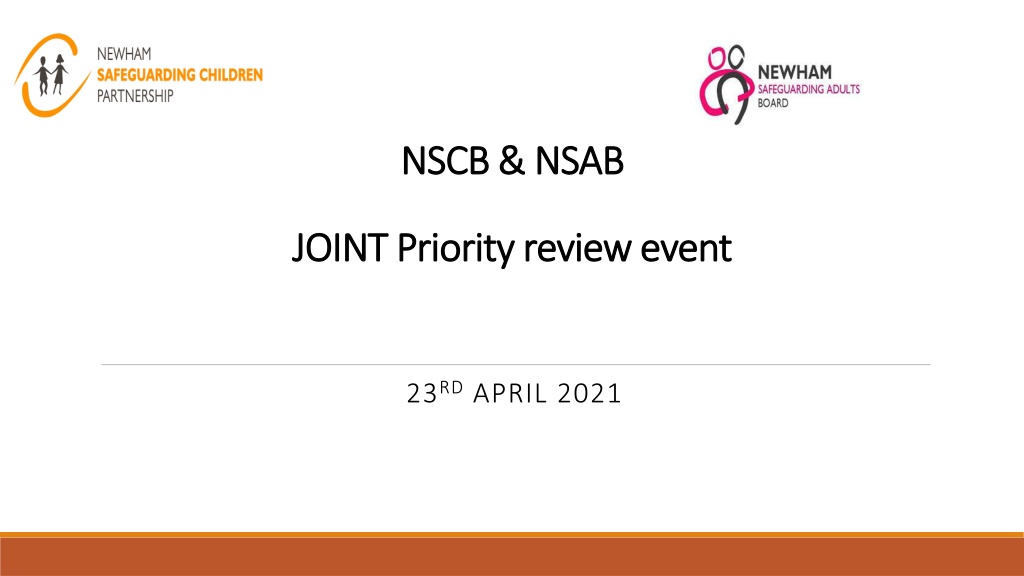
 undefined
undefined




 undefined
undefined

